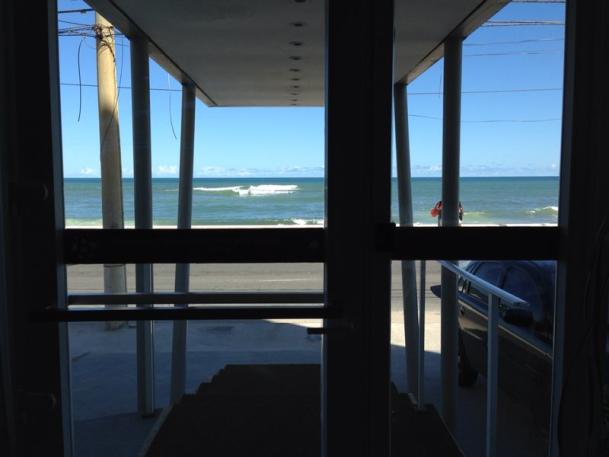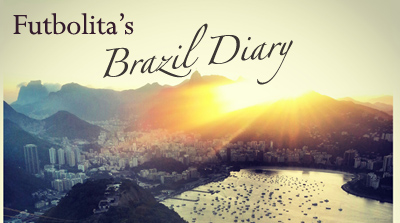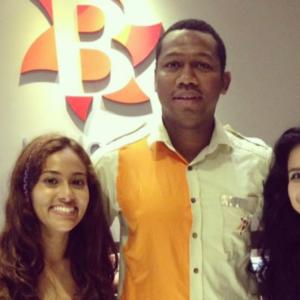*This article originally appeared on Yahoo! S.E.A, as part of the site’s World Cup coverage. It is a blow-by-blow factual account of what transpired during the police strike in Bahia, Salvador, and our experiences in the beautiful city, which will be hosting seven World Cup matches next month. (Read more of Brasil Diary here)

By Ash Hashim
IT’S no fun to be caught in the middle of a police strike in Salvador, Brazil, only two months before the World Cup.
Dubbed Brazil’s ‘capital of happiness’ for its numerous street parties, Salvador is one of the 12 cities scheduled to host matches at FIFA’s showpiece tournament when it kicks off on June 12.
It is also the city with one of the highest crime rates in Brazil, with least 39 deaths reported during the three-day police strike which started on April 14.

The city, known as Brazil’s capital of culture and Afro-heritage, is a must-do for visitors during the World Cup.
Salvador will host six World Cup matches, including a quarter final and a high-profile clash between defending champions Spain and the Netherlands.
However, during our stay there, we saw another brilliant side to the city – its people and their spirit of looking out for one another in the face of fear.
We arrived on the afternoon of the strike itself and was informed that no one was allowed to leave the premises under any circumstances, unless it was an emergency.
“They are having a police strike. There is no police on the street. You cannot go out as it is too dangerous. We are locking the doors, and you will stay here,” ordered Rafael Sousa, the hotel manager, as soon as we checked in.
“They have guns. Everyone out there has a gun, a stick or a knife!” added Luis, a colleague of Rafael’s, flailing his arms wildly.
Sousa and Luis both witnessed a similar police strike previously in 2012, which left more than 100 people dead over a 12-day span in the greater Salvador area.
The hotel had been robbed on a former occasion, and was forced to install additional security passwords to protect all its guests.
In addition, two policemen from a private Brazilian company were stationed at the hotel as the area was a hotspot for crime.
And although their words sounded straight out of a Hollywood film, it was clear that both Rafael and Luis were serious.

“They can shoot you, anytime. The gangs can drive past and fire a bullet at anybody they see on the street. They might try to break into this hotel and take our money. Anything can happen, and there will be no police to help you. You are responsible for your own life if you leave the hotel,” Luis explained, after we told him of our intentions to go to the beach, which was a stone’s throw away from the hotel (above).
“You girls are not going to the beach!” he ordered.
With the state’s police on strike because of little pay, lack of benefits and frustration at being overworked towards the World Cup, the streets of Salvador looked deserted, like an eerie scene from a video game.
Robbers roamed the beach while looters and troublemakers who took advantage of their new found ‘freedom’ were filmed breaking into shops by the Brazilian news crew.
Apart from a brave 24-hour diner near our hotel, all banks, offices and shops were closed for precautionary measures. Public buses remained empty and taxis worked round the clock to send people home safely.
A few locals were seen running on the streets, rushing home to make sure they would avoid any shady characters or activities.
In most parts of Brazil including Salvador, English is rarely or never spoken, so visitors during the World Cup are advised to pick up a few useful Portuguese phrases to help them along the way.
To quell our hunger pangs, Luis (seen above with us) offered to take us as well as other hotel guests to the nearest diner, which was the only one open in the street.
“Don’t bring your mobile phones. Bring only your money, around 20 reais ($11) and that is all. Do not wear a watch. Nothing. And don’t speak English!” he warned the group before walking us to the diner.
 With no metro or train system in place, the best way to travel around Salvador is by public bus, taxi or car.
With no metro or train system in place, the best way to travel around Salvador is by public bus, taxi or car.
We were not fully aware of the effects of the police strike until we took a taxi to the historical and ‘touristy’ site of the Pelourinho neighbourhood, where we were shuttled around without being allowed to leave the car.
“This place is a target for robbers because of the tourists. Those guys out there are looking at your cameras, your bags, and everything. If you leave, they might follow you, so be careful,” warned the taxi driver, pointing out to passers-by on the streets.
Indeed, every time we walked out to the beach or tried to stay on the streets of Salvador for five minutes, a passerby or local car slowed down on the road beside us and told us to go back.
“It’s not safe out here, girls. You must go inside. There are no police, just go back to your homes,” pleaded young man, who drove past the hotel.
Another middle-aged man who had been walking his dog gasped when we removed our mobile phones to pick up a call near the diner. “Don’t show your mobile phones here on the street. Go inside!” he warned.
Surfers on the beach, who risked it for the love of the waves, shouted: “It’s not safe here. There are robbers walking around. Go home, meninhas (girls).”
However, despite the police calling off the strike on the third day, more measures need to be put in place for the World Cup to prevent crime.
Despite the return of the police to the streets on our last day in Salvador, Rebekah found herself being threatened by a thief from the nearby ‘favela’ (shantytown).
After offering to sell her traditional Salvador ribbon bracelets, which are a tradition for all visitors to the city, the thief poked at her wallet and tried to draw out a 100 Reais note. “Give me the money. I have a knife under my shirt,” he whispered.
Clearly exasperated, Rebekah walked to get rid of the robber, who continued to follow us. “Take the bracelets back, she doesn’t want them. Be calm,” I told the robber in Portuguese. He refused to leave, and continued to pull at her wallet. “Give me the money,” he said.
With no police car in sight, I called out for a local teenage boy who had been standing nearby. He swiftly controlled the situation and told the intimidating robber to leave us alone.
Surely, if there’s a lesson worth learning in the strike, its that kindness can transcend any social problem.
And despite its numerous problems leading up to the World Cup, including public transport woes (there is no train system), Salvador’s own hospitality from its people certainly looks to be its saving grace.




